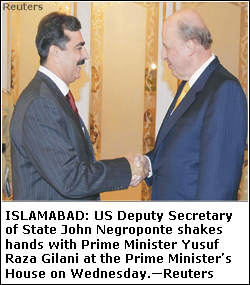 The political winds have shifted in Pakistan, which leaves the question: How will the dynamics of Pakistan's new political leaders play out with US policy goals in the region?
The political winds have shifted in Pakistan, which leaves the question: How will the dynamics of Pakistan's new political leaders play out with US policy goals in the region?
This Economist article provides some good context to recent and coming events in Pakistan. The article points out that that Administration's key ally, Musharraf, faces a serious threat from Supreme Court justices possibly being reinstituted. He could be further weakened by a potential impeachment proceeding. This leaves little room for Musharraf to maneuver. In fact, his only available option to exert his influence is to declare emergency rule. "Mr. Musharraf could try to buy time by re-imposing a state of emergency. However, the army has made clear that it will not intervene unless serious instability looms."
In another sign of abandonment, General Kayani relieved two of Mushraff's top general this week. Without the army on board, Musharaff is in trouble. This sets the stage for recently elected Prime Minister Yusuf Gilani. The Economist article suggests Pakistan's political crisis is not yet resolved and that in-fighting between the coalition's two major parties, the PPP and PML (N) is likely. With Musharraf's power waning, the United States must cultivate relationships with PM Gilani and coalition leaders, even through possible in-fighting.
Deputy Secretary of State John Negroponte is doing just that today during a meeting with PM Gilani.
"The prime minister made it clear that the new government would continue to fight terrorism in all its forms by using democratic, economic and strategic means. "It is also a matter of concern for us and we will confront it with complete determination.'
Mr Gilani said Pakistan accorded high priority to its strategic relationship with the US and desired to expand the relations in all fields. He said US President George W. Bush had called him and pledged full support to Pakistan in us spheres. The prime minister said economic empowerment of people living along the Afghan border was key to addressing the issue of extremism in the region.
He expressed confidence that the establishment of "reconstruction opportunity zones' would help increase economic activities in the area and create new opportunities for improving the standard of life of the people."